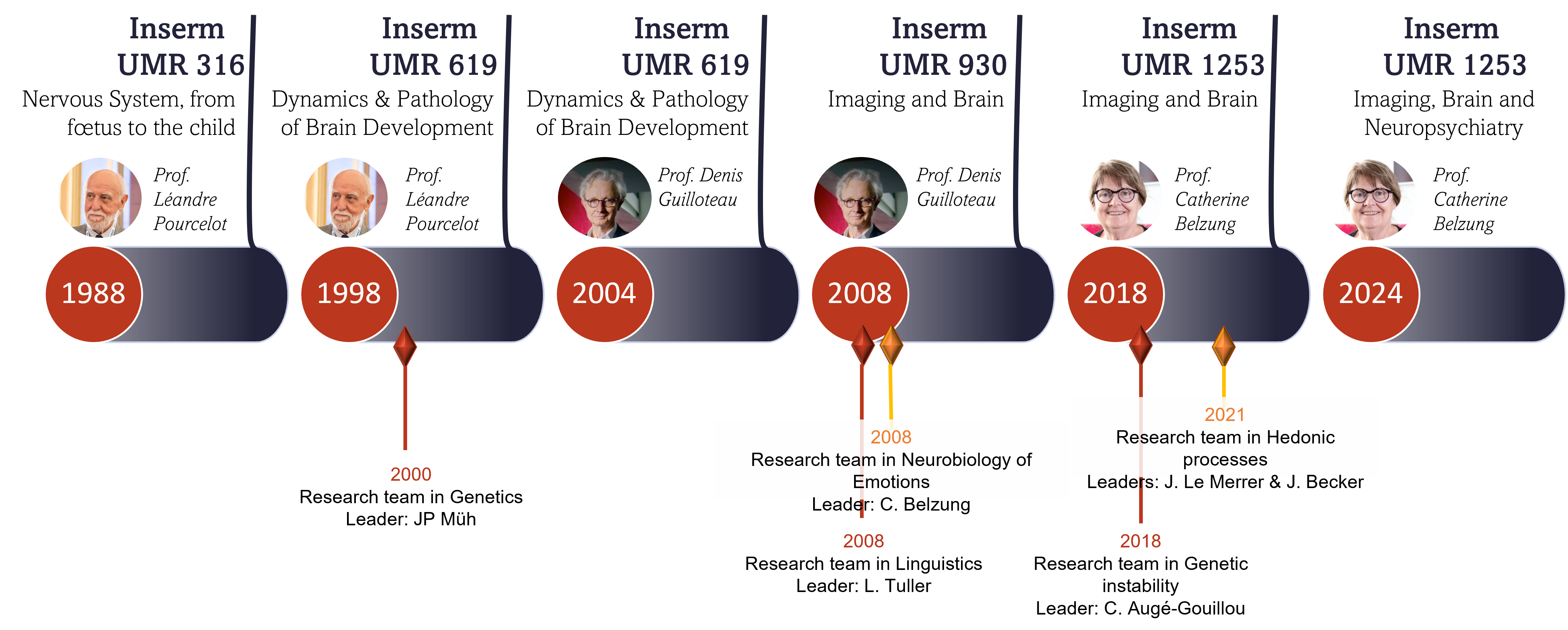Presentation
iBraiN’s primary goals are to conduct innovative research in neuropsychiatry, educate the upcoming generation of scientists and clinicians and engage the society in science.
More than 150 scientific and administrative staff, including more than 40 PhD students and postdoctoral fellows from several countries work in a stimulating and highly cooperative atmosphere. iBraiN currently comprises 4 research teams investigating three research areas:
- The underlying mechanisms of neuropsychiatric disorders,
- The identification of their specific signatures and biomarkers
- The design of innovative imaging tools and tailored therapies, for their diagnosis and treatments, respectively.
iBraiN’s staff coordinates or actively participates to clinical centers (e.g., Adult and Child CRA-CVL, CIC, Regional Trauma Center, etc.), FHU (e.g., Exac-T and GenoMeds), Excellence labels (e.g., MabImprove and IRON), national and international programs and networks (e.g., Mine, LACA, GIS Autisme, GDR Organoïdes, etc.). Additionally, iBraiN staff establish strong partnerships with parent associations (e.g., ARAPI, ADAPEI/UNAPEI, Autisme sans Frontières, Sésame Autisme, ARSLA, etc) and private companies (e.g., Mabsilico, Atos, Vermon, Curium, Siemens, Inviscan, etc).
iBraiN’s research is supported by regional (e.g., Région Centre-Val de Loire, FEDER, SFR SaNeC, etc.), national (e.g., ANR, PHRC, etc.), European (e.g., H2020, ERA-NET Neuron, ERAT-NET JPcofuND, FEANS, EuroNanoMed, etc.), and international fundings but also charities (e.g., FRM, FRC, Association ADN, Fondation Planiol, ARSLA, Foundation John Bost, Fondation FondaMental, etc.).
iBraiN is a world leader in neuropsychiatry and health technologies with more than 100 scientific publications per year, more than 15 patents and the creation of start-ups (e.g., Rheawave, Transderma, etc.).
History
iBraiN is the most important Inserm Lab in Tours. With its 180 people, it represents half of the Inserm potential in Tours.
iBraiN was born, albeit under a different name, in 1988, from the encountering of two key personalities with complementary approaches and expertise in ultrasound imaging and autism: Profs. Léandre Pourcelot and Gilbert Lelord. During its first 16 years, iBraiN was led by Prof. Léandre Pourcelot, expert in ultrasound, who allowed its creation and development and gave the initial spark; he launched this federative structure research and fostered links between public and private research. Then, Prof. Denis Guilloteau led the lab for 14 years. Expert in molecular imaging, and true visionary, he continued the development of public-private links (in particular via the Cyclotron, the CERRP) and brought real recognition to the lab at European level. Profs. Pourcelot, Lelord and Guilloteau are at the origin of the Lab's core: the design of innovative diagnostic (imaging, metabolomics, genomics) and therapeutic (ultrasound, nanobodies, intrabodies) modalities in psychiatry. Since 2018, Prof. Catherine Belzung is the Lab. Leader. Expert in neuroscience, while she pursues the work of her predecessors promoting transversality and transdisciplinarity, she also emphasizes innovation, international cooperation, the development of a greener research and strengthening relations with society.

